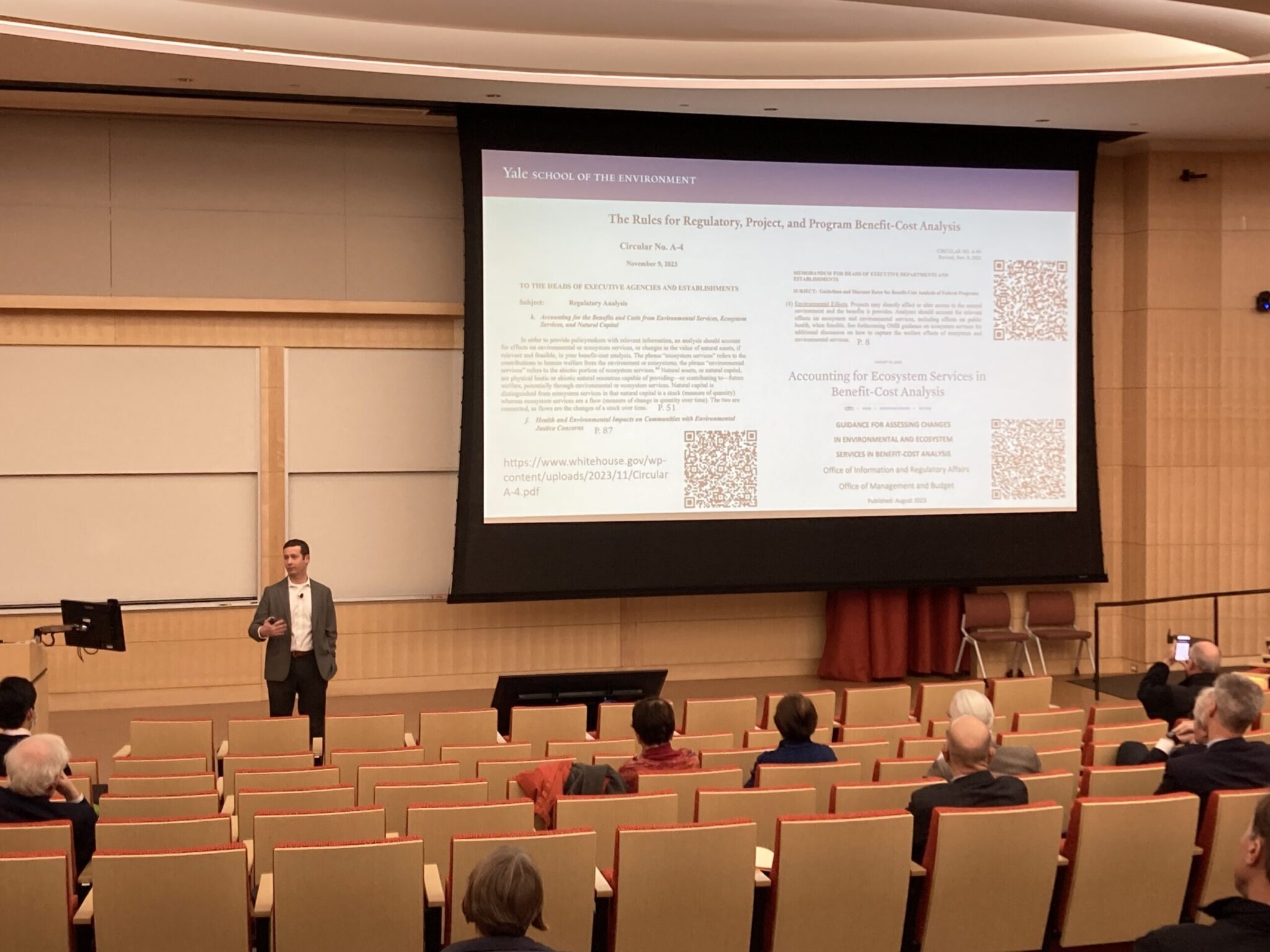Fenichel discusses how to use economics to promote environmental goals in federal legislation
On Nov. 15, the Yale Peabody Museum and the Yale Institute for Biospheric Studies hosted Professor Eli Fenichel in “Connecting Environment and Economy,” the fall edition of the Edward P. Bass distinguished lecture series.

Chris Tillen, Contributing Photographer
At a talk entitled “Connecting Environment and Economy” on Wednesday, Eli Fenichel, a professor of natural resource economics, discussed recent federal legislation that incorporates the environment into economic cost-benefit analysis, the first-ever guidance of its kind.
Fenichel’s talk, hosted in Marsh Lecture Hall from 5:00 p.m. to 6:00 p.m. with free public admission, presented new initiatives in environmental and economic policy. Fenichel spoke on his two-year experience as the assistant director of natural resource economics and accounting at the White House Office of Science and Technology Policy.
The lecture was part of the Edward P. Bass distinguished lectures, a series of biannual lectures co-sponsored by the Yale Peabody Museum and the Yale Institute for Biospheric Studies.
Fenichel spoke on the interconnectedness of the environment and the economy, referring to an unofficial unit of geologic time known as the Anthropocene.
“The idea of the Anthropocene is we have a new geologic period where people are now the driving force of geologic and earth system processes … all of our economic decisions are actually driving changes in the natural environment itself,” Fenichel said.
Fenichel was introduced by Carla Staver, associate director of the Yale Institute for Biospheric Studies and a professor of ecology and evolutionary biology. Throughout his lecture, Fenichel emphasized the importance of managing the environment as a regular part of the economy.
Fenichel further outlined the necessity of including natural capital, the acknowledgment of natural resources, in economic analyses. Currently, the United Nations and World Economic Forum have been involved in efforts to create a richer system that includes the environment in analyzing economic and social progress. Finichel noted that many African countries, Australia, Canada and Chile have begun to conduct natural capital accounting.
Fenichel shared a metaphor involving an income statement and a balance sheet. The summary of the income statement represents gross domestic product and the balance sheet includes natural and human capital. He noted the inclusion of natural resources in balance sheets run by the Organization for Economic Cooperation and Development.
Fenichel then discussed OMB Circular A-4, recent federal legislation that seeks to modernize cost-benefit analysis by including environmental factors. OMB Circular A-4 was last updated in 2003 under former President Barack Obama, however, Fenichel noted that the environment was only implicitly referenced in this earlier version.
Now, the environment is a central part of various sections of the legislation. Fenichel also said that the document provides clear guidelines on how to conduct cost-benefit analysis in order to assess changes in environment and ecosystem services.
This legislation, Fenichel said, will help the government with policy development.
“It really is about making better decisions and helping the government think through all of the stuff we’re asking it to do,” Fenichel said.
The update to OMB Circular A-4 has not yet been finalized but Fenichel stated he is confident it will be soon. After undergoing peer review, the legislation is currently posted as a draft for public comment by the White House.
Before opening the floor to questions, Fenichel finished his lecture with a reflection on his time at the White House.
“We built a bunch of new institutional structures to help us stop treating the environment as if it were free, while ensuring positive, real, economic growth,” Fenichel said.
After the event, Eliza King, assistant director of development for the Peabody Museum, told the News that Edward P. Bass distinguished lectures typically align with the biannual visitation of the Peabody Leadership Council, a group including young Yale alumni and experts in the fields of natural history.
Carol Denatale, the project director for the ongoing renovation at the Peabody Museum, stated that the leadership group of the Peabody Museum was in attendance at the lecture.
“This lecture topic ties in directly to some of the subjects that we’re trying to grapple with over at the museum … It’s a beautiful event to have for our particular group,” Denatale said.
Denatale added that the Peabody Leadership Council spent the earlier part of the day with Fenichel at the museum. Following the talk, the group headed back for dinner at the Peabody Museum.
Moreover, Edward P. Bass himself was in attendance at this lecture. King said that the Peabody Museum was especially grateful to Bass, who also founded the Yale Institute for Biospheric Studies, as Bass’s gift made the current renovation of the Peabody Museum possible.
The event was mostly attended by Yale faculty and staff of the Peabody Museum, but Yale undergraduates joined the talk as well. Michael Yao ’27 was at the talk, which he said was “incredibly exciting.”
“The reason I was drawn to come to Yale was that I’m interested in the environmental policy work here,” Yao said. “This is kind of the coolest thing I’ve been to.”
During the question and answer session, Yao asked Fenichel how many environmental decisions were made based on cost-benefit analysis.
Sarah Jeddy ’27 also attended the event due to a long-standing interest in the environment. She noted that, while planning on majoring in global affairs, she didn’t want to lose her connection to studying the environment.
“Even if I’m not going to study [the environment], I do want to learn more about it,” Jeddy said.
King praised the ability that Edward P. Bass lectures have to showcase fieldwork to anyone who is able to come. King cited the strength these lectures have in “bringing science to our various constituencies and doing it in a way that is so interesting and exciting.”
The Yale Institute for Biospheric Studies will host postdoctoral associate Nadia Zikiou for a talk on Dec. 1 from 3:00 p.m. to 4:00 p.m. This talk will cover dynamic landscapes.







